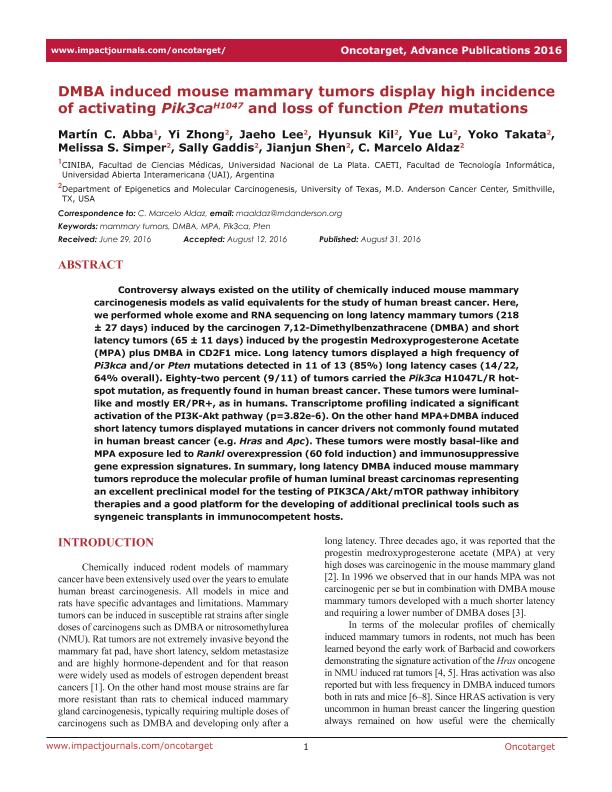Artículo
DMBA induced mouse mammary tumors display high incidence of activating Pik3caH1047 and loss of function Pten mutations
Abba, Martín Carlos ; Zhong, Yi; Lee, Jaeho; Kil, Hyunsuk; Lu, Yue; Takata, Yoko; Simper, Melissa S.; Gaddis, Sally; Shen, Jianjun; Aldaz, Claudio Marcelo
; Zhong, Yi; Lee, Jaeho; Kil, Hyunsuk; Lu, Yue; Takata, Yoko; Simper, Melissa S.; Gaddis, Sally; Shen, Jianjun; Aldaz, Claudio Marcelo
 ; Zhong, Yi; Lee, Jaeho; Kil, Hyunsuk; Lu, Yue; Takata, Yoko; Simper, Melissa S.; Gaddis, Sally; Shen, Jianjun; Aldaz, Claudio Marcelo
; Zhong, Yi; Lee, Jaeho; Kil, Hyunsuk; Lu, Yue; Takata, Yoko; Simper, Melissa S.; Gaddis, Sally; Shen, Jianjun; Aldaz, Claudio Marcelo
Fecha de publicación:
05/2016
Editorial:
Impact Journals
Revista:
OncoTarget
ISSN:
1949-2553
Idioma:
Inglés
Tipo de recurso:
Artículo publicado
Clasificación temática:
Resumen
Controversy always existed on the utility of chemically induced mouse mammary carcinogenesis models as valid equivalents for the study of human breast cancer. Here, we performed whole exome and RNA sequencing on long latency mammary tumors (218 ± 27 days) induced by the carcinogen 7,12-Dimethylbenzathracene (DMBA) and short latency tumors (65 ± 11 days) induced by the progestin Medroxyprogesterone Acetate (MPA) plus DMBA in CD2F1 mice. Long latency tumors displayed a high frequency of Pi3kca and/or Pten mutations detected in 11 of 13 (85%) long latency cases (14/22, 64% overall). Eighty-two percent (9/11) of tumors carried the Pik3ca H1047L/R hot-spot mutation, as frequently found in human breast cancer. These tumors were luminal-like and mostly ER/PR+, as in humans. Transcriptome profiling indicated a significant activation of the PI3K-Akt pathway (p=3.82e-6). On the other hand MPA+DMBA induced short latency tumors displayed mutations in cancer drivers not commonly found mutated in human breast cancer (e.g. Hras and Apc). These tumors were mostly basal-like and MPA exposure led to Rankl overexpression (60 fold induction) and immunosuppressive gene expression signatures. In summary, long latency DMBA induced mouse mammary tumors reproduce the molecular profile of human luminal breast carcinomas representing an excellent preclinical model for the testing of PIK3CA/Akt/mTOR pathway inhibitory therapies and a good platform for the developing of additional preclinical tools such as syngeneic transplants in immunocompetent hosts.
Palabras clave:
Dmba
,
Mammary Tumors
,
Mpa
,
Pik3ca
,
Pten
Archivos asociados
Licencia
Identificadores
Colecciones
Articulos(CCT - LA PLATA)
Articulos de CTRO.CIENTIFICO TECNOL.CONICET - LA PLATA
Articulos de CTRO.CIENTIFICO TECNOL.CONICET - LA PLATA
Citación
Abba, Martín Carlos; Zhong, Yi; Lee, Jaeho; Kil, Hyunsuk; Lu, Yue; et al.; DMBA induced mouse mammary tumors display high incidence of activating Pik3caH1047 and loss of function Pten mutations; Impact Journals; OncoTarget; 7; 39; 5-2016; 64289-64299
Compartir
Altmétricas



